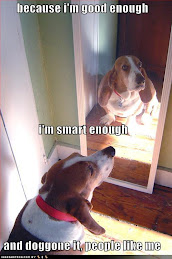The last two days of work this week I've been sitting in on a course that my department has been developing for about a year now. It's touched many hands in the design process, even my own, and I couldn't be more proud that mangers are attending and really getting a lot out of it. It was the first time I've seen the whole thing presented together, and it was amazing watching the "ah-ha" moments as people began to really get the concept.
It's more than just a class, it's actually an entirely new way of looking at learning in the workplace that hasn't been touched before. Normally leadership tries to fit you in a mold as a manager, but we have been allowed to create something that is customizable for each individual person.
One piece that is really strong in the class is the idea of Emotional Intelligence. EQ, as it's called, is not about what you do or what you know (IQ), it's about how you do it. As my coworker was telling the class, you may have a manager getting results, but they are leaving behind a bloody path of the walking-wounded behind them. People often dismiss the touchy-feely as unimportant, but employees are most likely to leave if they aren't getting the warmth, or appreciation from their manager. Everyone thinks that money is the number one motivator, but in actuality, it's appreciation. People want to feel like they have a purpose.
It's funny too, I was fortunate to hear Bob Pike speak when I was on the board of the local ASTD chapter at a conference I attended. I have been sharing this with my client frequently, as they really need to hear it. The statistics that he uses state, "about 60-70% of the time, a person is hired for their technical skills. But, in 99.9% of the time, they are fired for their interpersonal skills."
My coworker gave a job aid to the class on determining if you have high or low EQ which was adapted from Steve Hein, author of "EQ for Everybody". Here's what it said:
High EQ:
- Is not afraid to express his/her feelings
- Is able to read nonverbal communication
- Balances feelings with reason, logic, and reality
- Is intrinsically motivated
- Is emotionally resilient
Low EQ:
- Blames others for his/her feelings
- Attacks, blames, commands, criticizes, interrupts (in a bad way), invalidates, and judges
- Has no empathy or compassion for others
- Finds it hard to admit mistakes or apologizes
- Rigidly clings to his/her beliefs because he/she is too insecure to be open to new facts
Ways to Raise your EQ:
- Take responsibility for your feelings rather than blaming others for them. (e.g., "I feel jealous" rather than "You are making me jealous")
- Label your feelings rather than the situation (e.g., "I feel impatient", rather than "This is stupid!")
- Show respect for the feelings of others. (e.g., "How will he/she feel if I do this?")
- Feel energized, not angry. Use what people call anger to become energized and take productive action.
- Show empathy, understanding, and acceptance of other people's feelings.
- Do not command, control, criticize, judge or lecture others.
- Avoid people who do not respect your feelings.
Fortunately for me, my Myers-Briggs personality type is an ENFP - which makes me naturally have a very high EQ. It's not a choice, it's a need in me to always do the right thing, and put other people ahead of my own needs. I'm hard-wired that way.
What I find really interesting, is that people are uncomfortable with that. I normally get labeled "she's too nice", but in actuality, I have not, nor ever been a victim. I think accepting that allows me to be free.
I really don't need you to save me from myself, it's you who needs me to save you from you.
Subscribe to:
Post Comments (Atom)





No comments:
Post a Comment